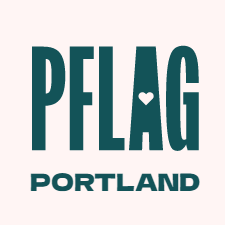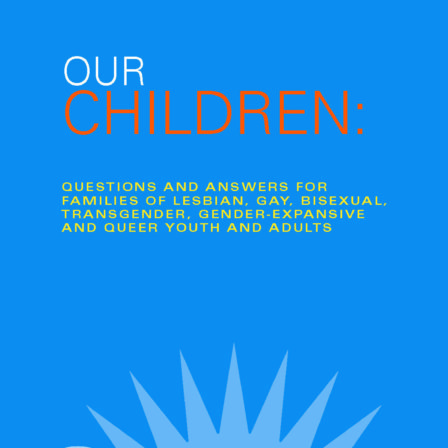First of all, congratulations!
Now, what do you do?
Love them. Listen to them. Let the news sink in. Remember that your child is still the same person, and still needs your love and support. It will take some time to absorb and process all of this new information. You will have many questions and experience a variety of emotions. Just remember that you are not alone. According to widely accepted statistics, one in four — or even one in three — families has an immediate family member who is lesbian, gay, bisexual or transgender (LGBT).
How can my child be sure?
If your child says that he or she is LGBT, they’re quite serious. Because our culture still stigmatizes LGBTQ people, there is very little chance that someone who is heterosexual would “choose” to be gay – as if it were a choice at all. Sexual orientation and gender identity are inherent traits, like eye and hair color. The only choice that your child has made is a courageous one – to be honest about who they are. He or she has chosen to “come out”.
Remember that someone who has “come out” to you has usually gone through a long and hard process of acknowledging his/her own sexual orientation. The fact that your child told you shows his/her love for you, their desire to have an honest relationship with you, and their need for your support. According to one study, up to 80% of gay youth report feeling severe social and emotional isolation. When that isolation begins in their own family, those youth are at very great risk.
Why did my child wait so long to tell me?
It takes many gay people a long time to figure out what they’re feeling. Many report growing up feeling “different,” but not really understanding why. When they eventually realized they were LGBTQ, many of the things they had felt growing up seemed to make sense. For others, the realization is triggered by the many changes that accompany adolescence. Some don’t recognize their sexual orientation or gender identity until adulthood.
In addition, our predominant culture teaches gay people that who they are is not “okay,” causing many to internalize self-hate or insecurity. The perceived risk of losing the love and support of the most important persons in one’s life is a powerful deterrent to coming out.
Why is my child gay?
It’s just the way some of us are made. Most scientists agree that it is likely the result of a complex interaction between biological and environmental factors. No one “caused” this.
Is being LGBTQ natural?
Yes. We don’t know why some people are LGBTQ, but we know that there always were, are, and always will be LGBTQ people.
But my religion teaches that homosexuality is wrong.
For some this can be the most difficult issue to reconcile. For others it is not an issue at all. Though some religions still condemn homosexuality (or the perception of it), more and more not only include, but celebrate the gay people in their communities. There are respected leaders within nearly every religious group who believe that it is wrong to condemn gay people. PFLAG Portland can refer you to information specific to your own religion, including local LGBTQ-friendly congregations. More questions on religion are answered here.
How will I tell my friends and family?
You may not for awhile, and you should not until you and your child have discussed and agreed on how to do so.
Coming out is a process of establishing control over one’s identity and destiny. We all do this as we grow up, but an LGBTQ child must do this in a world that is not often understanding or accepting of who they are.
More than one parent has observed that when their child “came out of the closet”, they went in and had to come out themselves. “Coming out” as a parent, however, involves both you and your child. You have begun a new journey together. Your child is very much your partner and your guide. He or she needs your support, but just as importantly your respect, cooperation, and discretion for you to both complete that journey happily and safely.
You and your child may find that agreeing to confide in trustworthy family and friends can help speed the process of acceptance and understanding. Those people often become your strongest supporters and allies. Once we are able to share our stories positively, we help those we tell become more accepting as well. PFLAG meetings are a good place to share your story with understanding parents and make new friends who share your experience.
Should I take him/her to therapy?
Not if the intent of that therapy is to “make them straight again”. The American Psychiatric Association, the American Psychological Association, the American Medical Association, and other mental health professionals all agree that homosexuality is not an illness, a mental disorder, or an emotional problem. It’s simply a fact of life for some people. To ask them to be or to behave otherwise is to ask them to behave unnaturally or to be something they are not. Organizations that offer such “reparative therapies” actually harm your child.
Many gay people or their family members do seek help to work through their feelings about coming out. Psychotherapy administered by LGBTQ-friendly professionals can be very beneficial. PFLAG Portland holds monthly meetings in which families help one another through what can be a difficult process.
I accept gay people, but why do they have to flaunt it?
To be blunt – Because everyone does. But let’s dive a little deeper.
Everyone expresses their sexual orientation and gender identity constantly. Heterosexuals express their orientation and identity constantly, with overt displays of affection, fashion and manners to attract the opposite sex, conversation about lovers and spouses, and pictures of loved ones proudly displayed at work. A wide range of expression is accepted. Yet many straight people are uncomfortable, even angry, when they see public displays of affection between members of the same sex. Because we have all been taught the untruth that something is wrong with LGBT orientation, this discomfort is understandable. But this belief is our problem, not a problem for LGBT people. If you feel that displays of sexual orientation should be private, then this should apply to everyone, both straight and gay.
Will my child be ostracized, have trouble finding or keeping a job, or even be physically attacked?
Possibly, but today discrimination and physical violence against LGBT persons are much rarer than they were when you were growing up, and strong laws now exist that punish those that do. Attitudes about differences in sexual orientation and gender identity are changing rapidly as society becomes better informed. Legal equality for LGBT people in the workplace and in society in general is more and more common.
Your child may experience bullying at school, on the Internet, or amongst peers. Check out the social environment at your child’s school, find out if their policies are gay and trans supportive, and work to change them if they aren’t. Work with your school’s administration to start or support a Gay-Straight Alliance (student-led, adult-advised interest groups for the understanding and inclusion of LGBTQ youth in society).
Your children’s generation is far less concerned about a person’s sexual orientation and gender identity than your own generation is. However, until homophobia and transphobia no longer exists in our society, your child may encounter some obstacles. That’s why it’s important for your child’s own family to be his/her strongest supporter.
What about AIDS?
HIV/AIDS is a sexually transmitted disease which can also be spread by unsterilized needles. It is not a “gay” disease, and it is nothing to be ashamed of. In other parts of the world, the disease has attacked mostly heterosexuals, and has spread amongst the straight community in the U.S. as well. Contracting HIV/AIDS says nothing about the person who has the disease. HIV infection is difficult to get and there is no medical reason to shun those who have it. The way a parent deals with HIV/AIDS must depend on the person who has the disease. But keep in mind: all people with HIV/AIDS need love and care. To show our love and support is more important than ever when a person has HIV/AIDS.
How can I best support my child?
The fact that you are reading this shows that you are a concerned, supportive parent. As with many other issues you may encounter within your family, you should be willing to talk, listen, and learn together with your child. In some cases, it may help for you both to be able to talk about your feelings, and PFLAG Portland is here to help you.
You are naturally your child’s strongest ally. Educate yourself as much as possible about LGBT issues and then help reduce the fear, misunderstanding, and cruelty that exists in our society. After all, it is silence that allows prejudice and discrimination to survive. Become that ally.
Our Children offers a fresh eye for families and others about what to do when a loved ones comes out. Full of useful knowledge, helpful tips, expert opinions and first-person stories, Our Children--which has a focus on sexual orientation and gender expression--is a must read for anyone looking to learn more about how to support LGBTQ loved ones...or looking for support for themselves.

